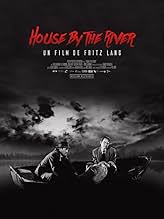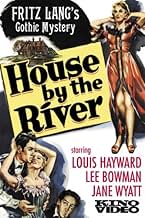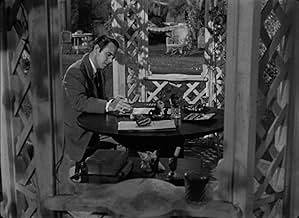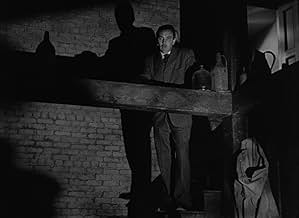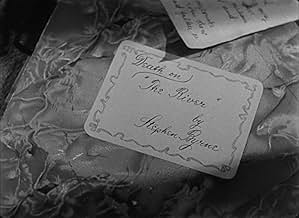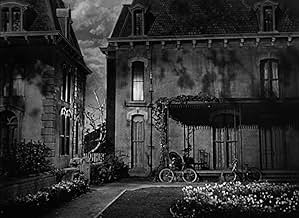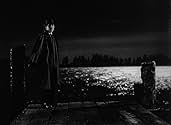VALUTAZIONE IMDb
7,0/10
4606
LA TUA VALUTAZIONE
Aggiungi una trama nella tua linguaA deranged writer murders a maid after she resists his advances. The writer engages his brother's help in hiding the body, causing unexpected problems for both of them.A deranged writer murders a maid after she resists his advances. The writer engages his brother's help in hiding the body, causing unexpected problems for both of them.A deranged writer murders a maid after she resists his advances. The writer engages his brother's help in hiding the body, causing unexpected problems for both of them.
- Regia
- Sceneggiatura
- Star
Bob Burns
- Courtroom Spectator
- (non citato nei titoli originali)
Edgar Caldwell
- Square Dancer
- (non citato nei titoli originali)
Edward Clark
- Minor Role
- (non citato nei titoli originali)
Frank Dae
- Col. Davis
- (non citato nei titoli originali)
Recensioni in evidenza
House by the River (1950)
A straight up Gothic murder scenario with echoes of the 1945 "Spiral Staircase." A family with two brothers at odds with each other is living in a house and one of them is a murderer. And at first only the audience knows who. Their relative isolation on the banks of a wide river means only that they will have little help when danger occurs. The neighbors and police and few and far.
Louis Hayward plays the main character, Stephen Byrne, a writer and a bit of a self-important cad. Hayward has an odd style on film during this era, attractive and likable at first, but with an acerbic humor and some kind of unworkable stiffness, as if you know he's always performing. But he's clever about it, and when you realize he isn't meant to be exactly lovable, he's pretty well cast. Byrne's brother, wife, and maid all come through with solid if uninspired performances, and you wonder exactly what held everyone back. Fritz Lang has many more successful melodramas than this one.
I think the weakness is largely the raw material, the story itself, which is a bit straight forward. One brother commits a murder, the other is drawn into helping cover it up, and then the tensions build between them as an inquest raises questions. It has moments, but there are no further twists that work. The ending is out of character, almost comical in its false (and unlikely) horror.
Along the way, though, are a series of nice scenes, inside the house at night, along the river at night, at a party meant to hide the killer's guilt, and so on. The music is especially helpful in jabbing the audience at key moments. American Georges Antheil was a composer famous for his avant-garde pieces in the 1920s in Europe before settling into a Hollywood routine. You can detect, and appreciate, the edge he brings to the score. The photography by contrast is good without rising up to the possibilities of these kinds of settings--the house, the river, the dock, all have more dramatic potential that we just don't see.
A straight up Gothic murder scenario with echoes of the 1945 "Spiral Staircase." A family with two brothers at odds with each other is living in a house and one of them is a murderer. And at first only the audience knows who. Their relative isolation on the banks of a wide river means only that they will have little help when danger occurs. The neighbors and police and few and far.
Louis Hayward plays the main character, Stephen Byrne, a writer and a bit of a self-important cad. Hayward has an odd style on film during this era, attractive and likable at first, but with an acerbic humor and some kind of unworkable stiffness, as if you know he's always performing. But he's clever about it, and when you realize he isn't meant to be exactly lovable, he's pretty well cast. Byrne's brother, wife, and maid all come through with solid if uninspired performances, and you wonder exactly what held everyone back. Fritz Lang has many more successful melodramas than this one.
I think the weakness is largely the raw material, the story itself, which is a bit straight forward. One brother commits a murder, the other is drawn into helping cover it up, and then the tensions build between them as an inquest raises questions. It has moments, but there are no further twists that work. The ending is out of character, almost comical in its false (and unlikely) horror.
Along the way, though, are a series of nice scenes, inside the house at night, along the river at night, at a party meant to hide the killer's guilt, and so on. The music is especially helpful in jabbing the audience at key moments. American Georges Antheil was a composer famous for his avant-garde pieces in the 1920s in Europe before settling into a Hollywood routine. You can detect, and appreciate, the edge he brings to the score. The photography by contrast is good without rising up to the possibilities of these kinds of settings--the house, the river, the dock, all have more dramatic potential that we just don't see.
Intense period thriller about a writer, Stephen Byrne (played by Louis Hayward), who lives in - yeah, you guessed it - a house by the river; with lovely yard and gazebo, yet oddly dark as the film opens with the sky clouded, shadows cast across scenery, haunting music, a dead animal floating by on the glistening water, and a black widow spider crawling over his writing. We meet the attractive, blonde servant girl, Emily, who Stephen clearly has a lustful eye on from the get-go. By the next scene, he tries to kiss her coming down the stairs after bathing in his tub, and, well, she screams and he "accidentally" strangles her. With his brother assisting him, they put her body in a big sack and sink her in the river, then follows the cover-up of the murder.
Well, this film is quite interesting, dark and suspenseful - there's a lot going on here. The print I saw looked strikingly full of sharp black and white contrast. The photography in this makes the film menacing with blackened rooms lit only by candle light casting dark, sharp shadows across the walls, some extreme camera angles up stairs and down halls, shots of faces seen only in mirrors, extreme close-ups, and sweat dripping on the face of a nervous murderer.
Well, this film is quite interesting, dark and suspenseful - there's a lot going on here. The print I saw looked strikingly full of sharp black and white contrast. The photography in this makes the film menacing with blackened rooms lit only by candle light casting dark, sharp shadows across the walls, some extreme camera angles up stairs and down halls, shots of faces seen only in mirrors, extreme close-ups, and sweat dripping on the face of a nervous murderer.
For some reason, the great director chose to degrade this film on some occasions, yet at other times he would revel in details of the film's opening quarter-hour. However, at the time that he made this film, he was despondent over the collapse of his Diana Productions which was a co-venture with Joan Bennett and her husband Walter Wanger. With no offers in sight from the majors, Lang chose to visit "Poverty Row" which may have left him with bad memories of a film of which he should have been more pleased.
In HOUSE BY THE RIVER, we have Lang working at the bargain basement Republic Pictures, where Orson Welles had just made a similar descent to make MACBETH. In each case, the decline was only in budget, not in quality. In Lang's case, we have a film that plays as a great companion piece to his SECRET BEHIND THE DOOR, both being a change of pace Gothic thriller from the master of spies and noir.
Incidentally, the promise of artistic freedom offered at Republic did stop when Lang attempted to cast a black actress as the maid. We're just lucky that Vera Hruba Ralston (wife of company head Yates) wasn't cast as the wife.
The screenwriter, Mel Dinelli, working from the A.P. Herbert novel, was a past and future hand at these "house" mellers - he previously did the screenplay for THE SPIRAL STAIRCASE and would do BEWARE, MY LOVELY in 1952. He segued well from Robert Siodmak to Fritz Lang as long-time Langian themes such as conscience and fate are in evidence here. Oddly, it is not the lead who suffers a conscience. Hayward's Stephen Byrne, a hack writer who has been lusting for the new maid played by Dorothy Patrick, revels in his self-promoted celebrity now that she's "disappeared." She's actually been accidentally murdered by Stephen, who had been filled with lustful thoughts as the maid bathed and seems to have a near orgasm as he hears the bathwater go down the drain outside the house - the look on Hayward's face is priceless.
It's his brother John who aided him in hiding the body (and who is referred to as having gotten his brother out of other scrapes) who turns to drink to quell his conscience and who is the primary suspect in the inquest. Little does he know that his brother is subtly implicating him in the crime in toto. His fate would be that no good deed (siblingly speaking) goes unpunished. The brother is played by Lee Bowman, and it's the only role of his in which I can say he's memorable. That's not to say that otherwise he's a forgettable player, just that he's not distinguishable from a bunch of mustachioed players who came out while the head ranks were off to war and who quickly had to retreat once they returned.
Hayward is so enjoying his celebrity that he's signing books by day and wife Jane Wyatt refers to him being out all night and smelling of cheap perfume when he comes home. She's beginning to realize that Lee Bowman's John Byrne is the better of the brothers, although the story implies that she was his own unrequited love.
But as unsympathetic as Stephen Byrne may be, before an audience ever rooted for Robert Walker trying to retrieve his lighter in STRANGERS ON A TRAIN, we share Stephen's fears of the body doing some synchronized swimming with the deer. While attempting to retrieve it, he only makes it worse for himself by accidentally (he can't do much right it seems) opening the top of the sack and letting out some flowing blond hair to make it even more obvious. When Stephen later finds that his brother's monogram is on the sack, he breaks into a devilish smile of contentment.
Cinematographer Edward Cronjager works well with Lang on their second pairing (the previous one was the gorgeous Technicolor WESTERN UNION). When the body (in a sack) starts popping up in the river, we recall the image of a floating deceased deer from earlier in the film and a character's claim that it shows up at about the same time every day given the tide.
If the ending seems rushed, it's only a reflection of the lead character's madness (a quick snap), unlike the state of mind of Chris Cross (Edward G. Robinson) at the ending of SCARLET STREET which is more detailed. It could have been a bit tidier, but maybe the head man cut the budget and schedule short. It was known to happen at Republic.
In HOUSE BY THE RIVER, we have Lang working at the bargain basement Republic Pictures, where Orson Welles had just made a similar descent to make MACBETH. In each case, the decline was only in budget, not in quality. In Lang's case, we have a film that plays as a great companion piece to his SECRET BEHIND THE DOOR, both being a change of pace Gothic thriller from the master of spies and noir.
Incidentally, the promise of artistic freedom offered at Republic did stop when Lang attempted to cast a black actress as the maid. We're just lucky that Vera Hruba Ralston (wife of company head Yates) wasn't cast as the wife.
The screenwriter, Mel Dinelli, working from the A.P. Herbert novel, was a past and future hand at these "house" mellers - he previously did the screenplay for THE SPIRAL STAIRCASE and would do BEWARE, MY LOVELY in 1952. He segued well from Robert Siodmak to Fritz Lang as long-time Langian themes such as conscience and fate are in evidence here. Oddly, it is not the lead who suffers a conscience. Hayward's Stephen Byrne, a hack writer who has been lusting for the new maid played by Dorothy Patrick, revels in his self-promoted celebrity now that she's "disappeared." She's actually been accidentally murdered by Stephen, who had been filled with lustful thoughts as the maid bathed and seems to have a near orgasm as he hears the bathwater go down the drain outside the house - the look on Hayward's face is priceless.
It's his brother John who aided him in hiding the body (and who is referred to as having gotten his brother out of other scrapes) who turns to drink to quell his conscience and who is the primary suspect in the inquest. Little does he know that his brother is subtly implicating him in the crime in toto. His fate would be that no good deed (siblingly speaking) goes unpunished. The brother is played by Lee Bowman, and it's the only role of his in which I can say he's memorable. That's not to say that otherwise he's a forgettable player, just that he's not distinguishable from a bunch of mustachioed players who came out while the head ranks were off to war and who quickly had to retreat once they returned.
Hayward is so enjoying his celebrity that he's signing books by day and wife Jane Wyatt refers to him being out all night and smelling of cheap perfume when he comes home. She's beginning to realize that Lee Bowman's John Byrne is the better of the brothers, although the story implies that she was his own unrequited love.
But as unsympathetic as Stephen Byrne may be, before an audience ever rooted for Robert Walker trying to retrieve his lighter in STRANGERS ON A TRAIN, we share Stephen's fears of the body doing some synchronized swimming with the deer. While attempting to retrieve it, he only makes it worse for himself by accidentally (he can't do much right it seems) opening the top of the sack and letting out some flowing blond hair to make it even more obvious. When Stephen later finds that his brother's monogram is on the sack, he breaks into a devilish smile of contentment.
Cinematographer Edward Cronjager works well with Lang on their second pairing (the previous one was the gorgeous Technicolor WESTERN UNION). When the body (in a sack) starts popping up in the river, we recall the image of a floating deceased deer from earlier in the film and a character's claim that it shows up at about the same time every day given the tide.
If the ending seems rushed, it's only a reflection of the lead character's madness (a quick snap), unlike the state of mind of Chris Cross (Edward G. Robinson) at the ending of SCARLET STREET which is more detailed. It could have been a bit tidier, but maybe the head man cut the budget and schedule short. It was known to happen at Republic.
Louis Hayward utters this chilling line. His brother, Lee Bowman, has a physical disability. He has always been loyal to Hayward. But Hayward is looking out for number one -- big time.
I had seen a terrible print of this movie once years ago and figured it to be lesser Fritz Lang. Not so! It is certainly one of the very best of his American movies. It's beautifully filmed, extremely well plotted, and cast superbly.
It is, in summary, a terrifying movie.
The Hayward character is responsible for a killing very early in the plot. He had not intended it, though his motives were not very high in the circumstance causing it. He doesn't care whom he drags down to keep his name clear and finish the book he is writing about the crime.
In addition to excellent performances by Hayward, Bowman, and Jane Wyatt as Hayward's wife, the supporting cast is a dream: Plump Jody Gilbert is pathetic and hateful simultaneously as Bowman's maid. Ann Shoemaker gives a touch of comic relief -- but just a touch -- as a nosy neighbor of Hayward and Wyatt.
Like the best of Lang -- "The Big Heat," "Fury," "M," "Metropolis," and the Mabuse films -- this concerns morality and its lack. There is a Biblical feel to it, as evidenced in the quote from Hayward (Cain) regarding his fine brother Abel/Bowman.
It could scarcely be better than it is.
I had seen a terrible print of this movie once years ago and figured it to be lesser Fritz Lang. Not so! It is certainly one of the very best of his American movies. It's beautifully filmed, extremely well plotted, and cast superbly.
It is, in summary, a terrifying movie.
The Hayward character is responsible for a killing very early in the plot. He had not intended it, though his motives were not very high in the circumstance causing it. He doesn't care whom he drags down to keep his name clear and finish the book he is writing about the crime.
In addition to excellent performances by Hayward, Bowman, and Jane Wyatt as Hayward's wife, the supporting cast is a dream: Plump Jody Gilbert is pathetic and hateful simultaneously as Bowman's maid. Ann Shoemaker gives a touch of comic relief -- but just a touch -- as a nosy neighbor of Hayward and Wyatt.
Like the best of Lang -- "The Big Heat," "Fury," "M," "Metropolis," and the Mabuse films -- this concerns morality and its lack. There is a Biblical feel to it, as evidenced in the quote from Hayward (Cain) regarding his fine brother Abel/Bowman.
It could scarcely be better than it is.
The most interesting aspect of House By The River is the fact that it was produced at Republic Pictures, the home of Roy Rogers and several other B movie cowboys and the values those pictures put forth. Hardly the place for a moody and atmospheric thriller that examines a man's moral degeneracy directed by Fritz Lang who always likes to explore the dark. One thing that does mark this as a Republic film is the usual Herbert J. Yates economy.
But for a director like Lang who was used to exploring shadowy worlds, economy on the set isn't a hindrance, though back in Germany this man directed the opulent Metropolis. House By The River delivers the most for its meager budget.
Louis Hayward who was a poor man's Tyrone Power and like Power could play straight heroes and hero/heels gets his Nightmare Alley type role as the rich and idle writer who just can't move the writer's block. He takes a real fancy to maid Dorothy Patrick and when she repulses his advances, Hayward kills her. He gets older and club footed brother Lee Bowman to dump the body in the river. But as dead bodies will do, they bloat and have a nasty habit of floating to the top.
Lang and Hayward create a really frightening picture of moral degeneracy that would have resonated well with post World War II audiences who had just defeated a nation gripped in the philosophy that it was a race of super people. Jane Wyatt gets her innings in playing Hayward's wife who Bowman also loved and who starts thinking that maybe she married the wrong brother.
I have to single out Jody Gilbert from the cast who plays Bowman's housekeeper and who Bowman takes his frustrations out on after he's helped Hayward. She's not the sharpest knife in the drawer and misreads all of Bowman's signals and later does him damage at a coroner's inquest.
I'm not sure how much money House By The River brought in to Republic Pictures, but it is a minor masterpiece for this studio.
But for a director like Lang who was used to exploring shadowy worlds, economy on the set isn't a hindrance, though back in Germany this man directed the opulent Metropolis. House By The River delivers the most for its meager budget.
Louis Hayward who was a poor man's Tyrone Power and like Power could play straight heroes and hero/heels gets his Nightmare Alley type role as the rich and idle writer who just can't move the writer's block. He takes a real fancy to maid Dorothy Patrick and when she repulses his advances, Hayward kills her. He gets older and club footed brother Lee Bowman to dump the body in the river. But as dead bodies will do, they bloat and have a nasty habit of floating to the top.
Lang and Hayward create a really frightening picture of moral degeneracy that would have resonated well with post World War II audiences who had just defeated a nation gripped in the philosophy that it was a race of super people. Jane Wyatt gets her innings in playing Hayward's wife who Bowman also loved and who starts thinking that maybe she married the wrong brother.
I have to single out Jody Gilbert from the cast who plays Bowman's housekeeper and who Bowman takes his frustrations out on after he's helped Hayward. She's not the sharpest knife in the drawer and misreads all of Bowman's signals and later does him damage at a coroner's inquest.
I'm not sure how much money House By The River brought in to Republic Pictures, but it is a minor masterpiece for this studio.
Lo sapevi?
- QuizFritz Lang originally wanted a black woman to play the role of Emily Gaunt, but the producers refused.
- BlooperThe women are dressed in turn of the century type clothing but the men are wearing modern hats and suits.
- Citazioni
John Byrne: You must be very, very ill Stephen...
Stephen Byrne: Ill?
- Colonne sonoreTurkey in the Straw
(uncredited)
American folk song
Author unknown
I più visti
Accedi per valutare e creare un elenco di titoli salvati per ottenere consigli personalizzati
- How long is House by the River?Powered by Alexa
Dettagli
- Tempo di esecuzione1 ora 23 minuti
- Colore
- Proporzioni
- 1.33 : 1
Contribuisci a questa pagina
Suggerisci una modifica o aggiungi i contenuti mancanti


